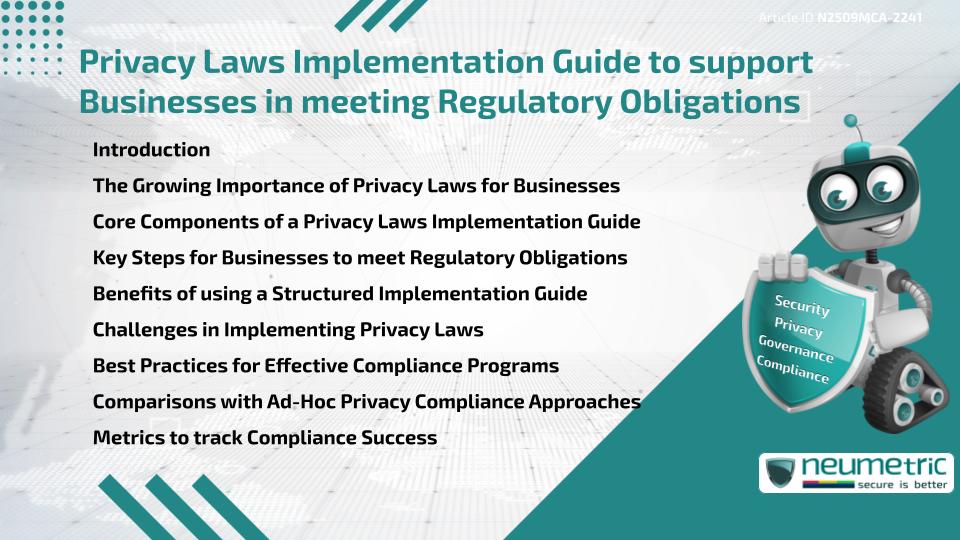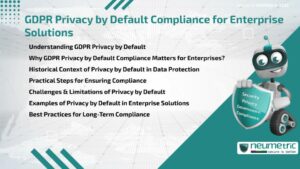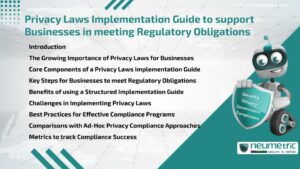Table of Contents
ToggleIntroduction
A Privacy Laws implementation Guide provides Businesses with a structured Framework to comply with complex Data Protection Regulations. By following such a Guide, Organisations can align their practices with Global Standards, reduce exposure to Penalties & build Trust with Stakeholders. These Guides often include step-by-step procedures, checklists & Best Practices that enable companies to navigate Regulations such as the General Data Protection Regulation [GDPR], the California Consumer Privacy Act [CCPA] & other emerging frameworks.
The Growing Importance of Privacy Laws for Businesses
As more jurisdictions introduce Privacy Laws, Organisations face increasing pressure to adapt. Regulations like the GDPR & CCPA have raised global awareness about the Rights of Individuals over their Personal Data. Non-Compliance can result in heavy Fines, Reputational harm & the loss of Consumer Confidence. Businesses, therefore, require a systematic approach to managing Privacy obligations. The European Commission’s GDPR Resources & the California Attorney General’s CCPA portal provide helpful Regulatory insights.
Core Components of a Privacy Laws Implementation Guide
A well-designed Privacy Laws implementation Guide typically includes:
- Data Inventory processes to identify what data is collected & stored
- Risk Assessments to evaluate Vulnerabilities & Compliance Gaps
- Policy Frameworks outlining Data Handling, Retention & Deletion Procedures
- Training Modules for Employees on Privacy requirements
- Monitoring Mechanisms for ongoing Compliance tracking
These components ensure that Compliance is integrated into daily Business Operations rather than treated as a one-time exercise.
Key Steps for Businesses to meet Regulatory Obligations
To adopt a Privacy Laws implementation Guide effectively, Organisations should:
- Map all Personal Data flows across Departments & Systems
- Identify Legal bases for Data Processing under Applicable Laws
- Draft or update Privacy Policies & notices for Transparency
- Establish Incident Response Procedures for potential Data Breaches
- Conduct regular Audits to assess Compliance readiness
Benefits of using a Structured Implementation Guide
Employing a structured Privacy Laws implementation Guide offers significant benefits, including:
- Reduced Risk of Regulatory Fines & Penalties
- Stronger Accountability & Governance frameworks
- Improved Consumer Confidence & Trust in Data Handling Practices
- Streamlined processes that save Time & Resources
This approach shifts Compliance from a reactive obligation to a proactive Business advantage.
Challenges in Implementing Privacy Laws
Organisations often face hurdles such as limited Resources, lack of in-house Expertise & constantly changing Regulations. Multinational Businesses must also address inconsistencies across Jurisdictions, which can complicate Compliance Programs. Resistance from Employees unfamiliar with Privacy practices can further delay implementation.
Best Practices for Effective Compliance Programs
To overcome challenges, Businesses should:
- Appoint a dedicated Privacy Officer or Compliance Leader
- Provide Ongoing Training & Awareness Programs
- Leverage Automation Tools for Data Monitoring & Reporting
- Document all Compliance activities for Audit readiness
- Engage Legal & IT Experts for guidance on Regulatory updates
Comparisons with Ad-Hoc Privacy Compliance Approaches
An ad-hoc approach to Compliance may address short-term needs but often leaves gaps that increase Risk exposure. By contrast, a Privacy Laws implementation Guide offers a comprehensive Framework that emphasises Consistency, Documentation & Continuous Improvement. Over time, the structured approach proves more sustainable & cost-effective.
Metrics to track Compliance Success
To measure the effectiveness of a Privacy Laws implementation Guide, Organisations should track:
- Number of identified Compliance Gaps closed within a set timeframe
- Frequency of Data Breaches or Incidents Reported
- Employee Training completion rates
- Audit success rates & Regulator feedback
These metrics provide tangible Evidence of Compliance efforts & highlight Areas for Improvement.
Takeaways
A Privacy Laws implementation Guide equips Businesses with a systematic method to meet Regulatory obligations while safeguarding Personal Data. By following Structured steps, adopting Best Practices & tracking Measurable Outcomes, Organisations can strengthen Compliance, reduce Risks & build lasting Trust with Stakeholders.
FAQ
What is a Privacy Laws implementation Guide?
It is a structured Framework that helps Organisations comply with Privacy Regulations by outlining Policies, Processes & Best Practices.
Why should Businesses use such a Guide?
It reduces Risks, ensures Regulatory Compliance & helps maintain Consumer Trust through consistent Privacy Practices.
Does it apply only to Large Organisations?
No, Businesses of all sizes benefit from using an Implementation Guide, as Privacy Laws apply universally.
How often should Privacy Programs be updated?
They should be reviewed at least annually & whenever new Regulations or business processes are introduced.
What are common challenges in adopting a Guide?
Challenges include limited Resources, lack of Expertise & managing differences across International Regulations.
Can Automation help in implementation?
Yes, Automation Tools can simplify Monitoring, Reporting & Data tracking, making Compliance more efficient.
Is Employee Training necessary?
Absolutely, as Employees are key to ensuring Compliance in daily operations.
Need help for Security, Privacy, Governance & VAPT?
Neumetric provides organisations the necessary help to achieve their Cybersecurity, Compliance, Governance, Privacy, Certifications & Pentesting needs.
Organisations & Businesses, specifically those which provide SaaS & AI Solutions in the Fintech, BFSI & other regulated sectors, usually need a Cybersecurity Partner for meeting & maintaining the ongoing Security & Privacy needs & requirements of their Enterprise Clients & Privacy conscious Customers.
SOC 2, ISO 27001, ISO 42001, NIST, HIPAA, HECVAT, EU GDPR are some of the Frameworks that are served by Fusion – a SaaS, multimodular, multitenant, centralised, automated, Cybersecurity & Compliance Management system.
Neumetric also provides Expert Services for technical security which covers VAPT for Web Applications, APIs, iOS & Android Mobile Apps, Security Testing for AWS & other Cloud Environments & Cloud Infrastructure & other similar scopes.
Reach out to us by Email or filling out the Contact Form…





